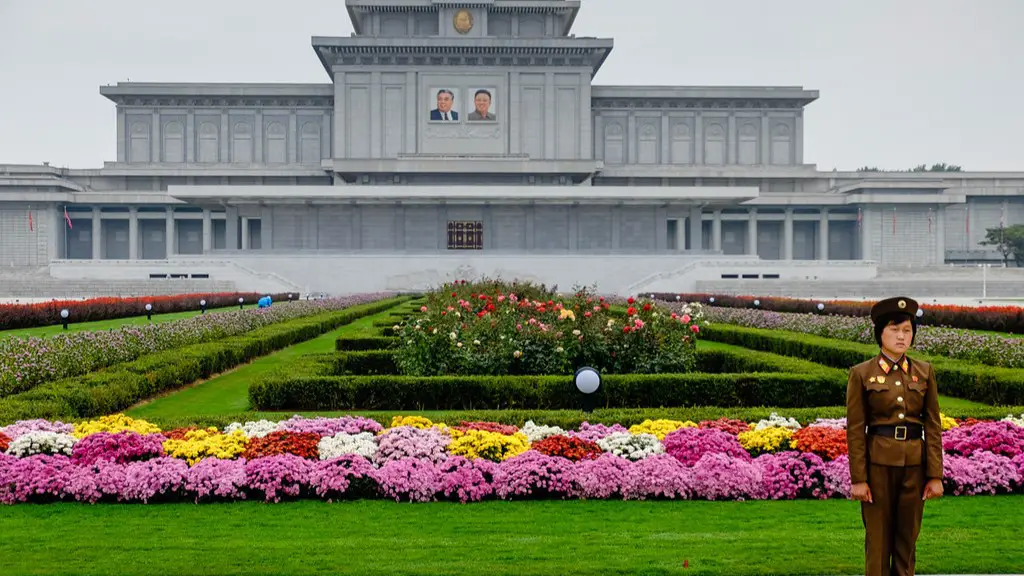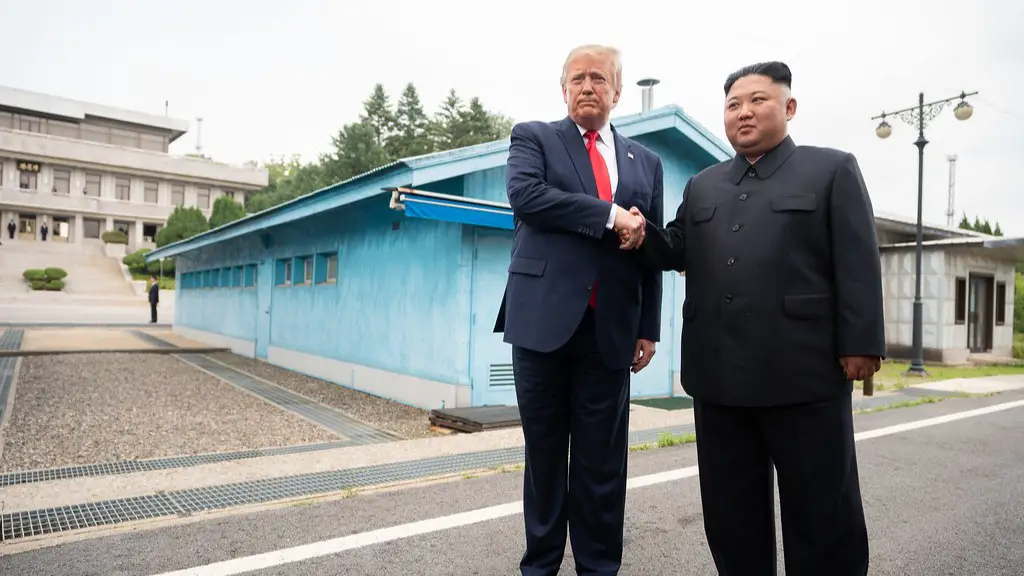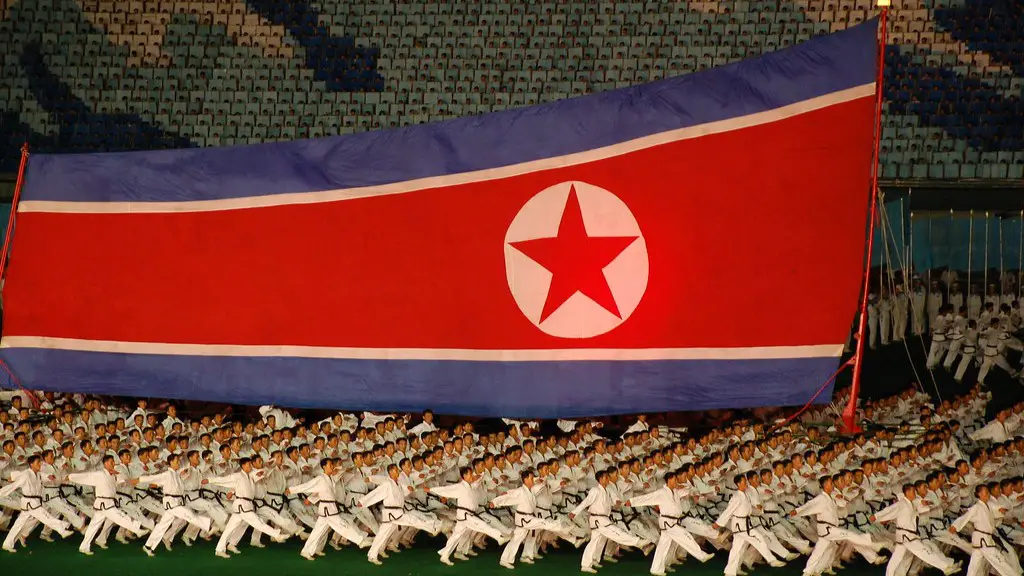The relationship between the United States and North Korea has always been fraught with tension. This tension has become even more visible with the North Korean government’s nuclear weapons program, which has put both states at the brink of potential armed conflict. As the security crisis between both nations continues to unfold, it is important to understand the underlying factors that contribute to the heightened tension between the two countries.
At its core, the strain between the United States and North Korea is rooted in historical factors. Since the end of the Korean War in 1953, the subtle ideological and economic differences between the United States and North Korea have caused strained relations over the decades. These differences are further exacerbated by the US government’s view of the North Korean government as an oppressive communist regime that perpetuates human rights abuses. Additionally, the US has consistently criticized North Korea’s nuclear program, accusing it of destabilizing the region and undermining peace.
According to experts, North Korea’s nuclear weapons program significantly contributes to tensions between the two countries. The North Korean government has argued for decades that its nuclear weapons program is a necessary strategy for its own security and survival in the face of US aggression. As a result, this has created a cycle of distrust between the two countries. The US government has responded to these claims by launching economic sanctions and diplomatic pressure campaigns, which have only added fuel to the fire.
Furthermore, the deteriorating relationship between the United States and North Korea has also been made worse by the volatile rhetoric used by both state leaders. President Donald Trump has publicly criticized the North Korean government several times and has referred to its leaders using derogatory language. Meanwhile, the North Korean government has consistently threatened to launch nuclear strikes against the United States. Both sides’ negative rhetoric and constant provocation suggest that tensions may even further escalate in the near future.
On the other hand, there have recently been advancements in diplomatic discussions between the two countries. In 2018, North Korean leader Kim Jong-un met with President Trump in Singapore for talks on denuclearization, with some North Korean concessions being made in the process. More recently, North Korean officials have expressed openness to holding informal talks with the US. Despite the positive signs, there have been few tangible developments and meaningful progress has been difficult to achieve.
Similarly, the international community has expressed its desire to help deescalate tensions between the US and North Korea. China, Japan and South Korea have all proposed diplomatic solutions to the crisis. Despite their enthusiasm, most of these proposals have been unsuccessful due to the US government’s unwillingness to compromise.
Effects of Tension Between US and North Korea
The tension between the United States and North Korea has had serious consequences for the region. Firstly, the hostile relationship between the two states has caused security concerns for all neighboring countries. This is especially true in South Korea, which is threatened by North Korea’s nuclear weapons program and periodically faces military provocations from the North.
Additionally, the regional security crisis has had significant economic ramifications. For example, both the US and North Korea implemented extensive sanctions against each other, drastically limiting trade and investments between the two countries. Furthermore, these sanctions have adversely affected the economies of several other countries in the region, particularly those in East Asia.
Finally, the US-North Korea tension has hindered progress on other pressing issues, such as the humanitarian crisis in North Korea. Despite the urgent needs of the North Korean people, the US government’s focus on national security concerns has caused it to overlook this critical aspect of the problem.
Ideas For Deescalating Tension
In order to address the heated tension between the United States and North Korea, there is a need for a more effective diplomatic strategy. Experts suggest that the US should focus more on engaging in meaningful dialogue with North Korea and perhaps view it as a partner rather than an adversary. Emphasizing diplomatic initiatives and finding common ground could pave the way to greater understanding and trust between the two countries.
Additionally, the US government should consider revising its sanctions against North Korea. While sanctions do have a role to play in maintaining international security, they have proven to be ineffective in bringing the North Korean government to the negotiating table. The United States should look into other economic policies that focus on mitigating economic harms, such as providing economic assistance to vulnerable populations.
In addition, the US should also engage in international partnerships in order to find a resolution to the crisis. The US should work closely with regional stakeholders such as China, Japan and South Korea in order to come up with a sustainable solution. Multinational collaborators could also provide a valuable platform for meaningful dialogue, which could help to alleviate tensions between the two countries.
The Impact of US and North Korea Dispute
The dispute between the United States and North Korea is having a global impact, from regional security issues to international political dynamics. On the global stage, the intense rivalry between the two countries has shown that the US is not willing to immediately confront North Korea militarily. Instead, it has focused mostly on economic and diplomatic measures in order to restrict the nuclear program of North Korea. This strategic shift has altered global political relations in the region and beyond.
Furthermore, as the dispute continues, the global community is increasingly taking notice of the dire humanitarian situation in North Korea. As the result of severe economic punishments, the people of North Korea have suffered immensely and stand in dire need of humanitarian aid. By raising awareness of this dire humanitarian crisis, the US and North Korea dispute is illuminating the importance of humanitarian aid in difficult political climates.
Additionally, the conflict between the US and North Korea has led to a deadlocked situation in global nuclear disarmament discussions. North Korea’s nuclear weapons program has inspired other countries to follow suit, as evidenced by recent nuclear development initiatives in countries such as Iran. Even though global nuclear non-proliferation efforts have been largely unsuccessful, the US-North Korea dispute has encouraged the international community to strengthen these initiatives in order to prevent further militarization in the world.
The Influence of China
The actions taken by the China government has greatly influenced the current US-North Korea confrontation. China has sought to remain a neutral stakeholder in the dispute, maintaining diplomatic ties with both countries while also admonishing the use of violence to resolve the issue. Furthermore, China has also employed economic measures such as imposing its own sanctions on North Korea. Ultimately, China’s attempts to remain out of the escalating tensions and its commitment to peaceful negotiations has encouraged other nations to stand behind the principle of diplomacy.
Apart from mediation, China has also been providing economic resources to North Korea. By maintaining economic ties with North Korea, the Chinese government has been able to pressure the North Korean government to make concessions. For example, North Korea has recently agreed to certain economic measures such as allowing foreign investments and opening certain sectors of its economy for international business. Such decisions suggest that China has become an increasingly influential factor in the US-North Korea crisis.
Furthermore, China has also acted as a form of mediator between the US and North Korea by introducing President Xi Jinping’s “double suspension” plan. Under this plan, both countries were encouraged to suspend their respective hostile actions in order to deescalate the tension. While there have been some developments in this plan, it has been mostly unsuccessful, due to the US government’s consistent refusal to accept any concessions by the North Korean government.
Potential Outcomes Of Dispute
At the end of the day, the US-North Korea military dispute is far from over and the potential outcome is uncertain. It is important to consider the possible scenarios that could arise from this tension. On the one hand, it is possible that diplomacy and dialogue between the two countries could lead to a peaceful resolution. On the other hand, the continued development of North Korea’s nuclear weapons program could potentially lead to a full-scale military conflict.
However, it is also important to consider alternative scenarios. North Korea could also decide to abandon its nuclear weapons program, keeping in mind its need for economic and social stability. In such a case, the diplomatic efforts could lead to a peaceful outcome, establishing a sense of trust between the two states.
Finally, there is also the possibility that the US and North Korea would come to an agreement in which the US would provide economic assistance in exchange for North Korea’s abandonment of its nuclear weapons program. Such an agreement would open up new avenues for economic investments and growth in the region. Needless to say, the actual outcome of the dispute is impossible to predict and both countries will need to make serious compromises before it can be resolved.





